® INVALSI – Via Ippolito Nievo, 35 – 00153 ROMA – tel. 06 941851 – fax 06 94185215 – c.f. 92000450582 | Cookies – Privacy Policy – Photo Credits
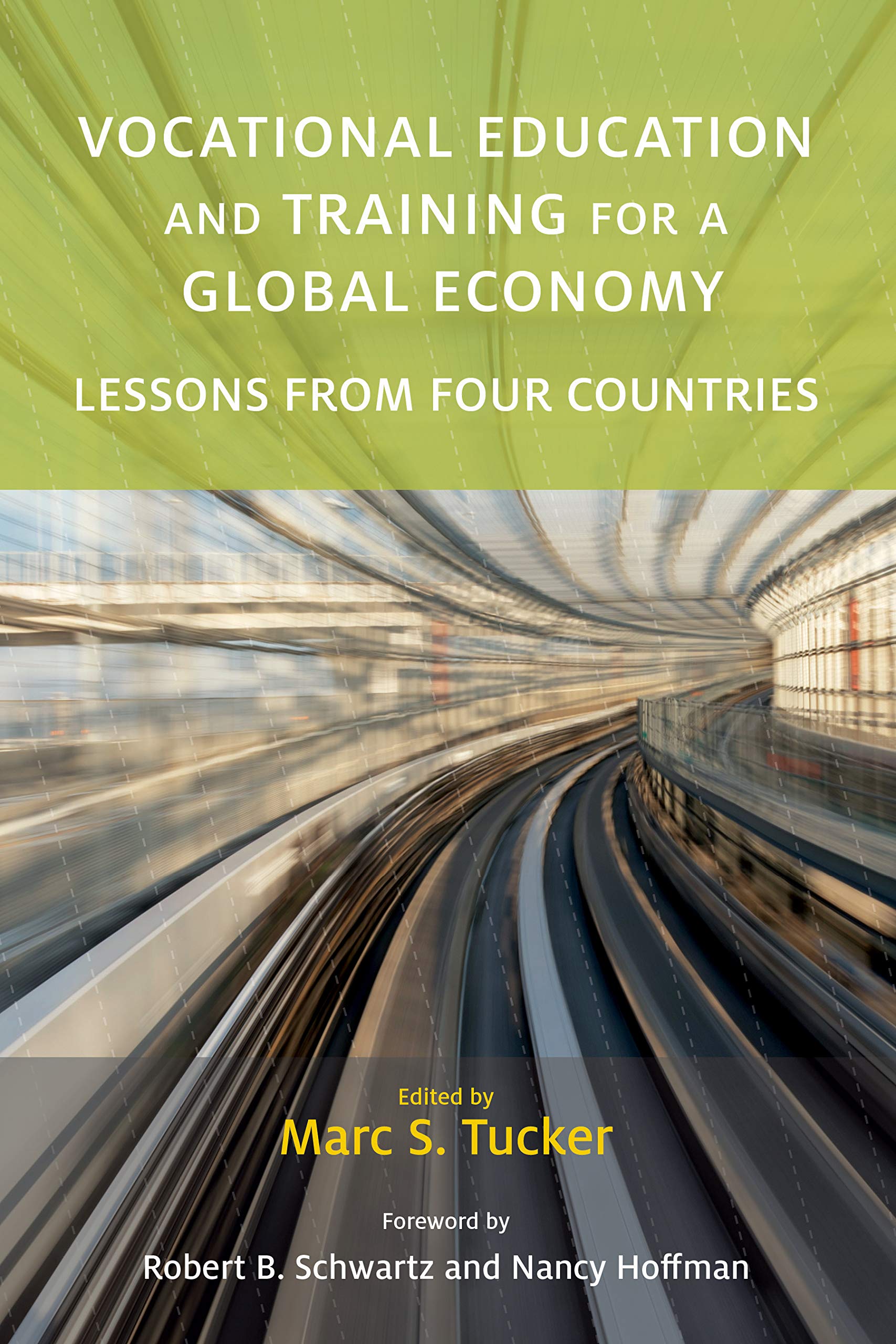
A cura di: Marc Tucker (2019)
Editore: Harvard Educational Publishing Group, Cambridge
Collana: Work and Learning Series
Codice ISBN: 9781682533895
Vocational Education and Training for a Global Economy investigates the greatly varying ways in which four countries-Singapore, Switzerland, China, and the United States-prepare young people for the twenty-first-century workplace. The book looks first at the highly successful vocational education and training (VET) systems in Singapore and Switzerland, describing them in revealing detail and accounting for the assumptions and social arrangements that account for their unique features. It then turns to the two largest-and arguably the most dynamic-nations in the world, China and the United States, and examines the differing conditions, goals, and arrangements that have affected their respective programs for preparing their citizens for present and future work. At a time when a highly competitive global economy is prompting profound changes in the workplace and in the skills required for professional success, all countries feel a heightened sense of urgency in finding ways to guide and prepare young people for work. As this book makes clear, however, the resulting preparatory systems within these four countries differ dramatically-and for a wide range of economic, cultural, and political reasons. A detailed and incisive look at VET systems in the United States and abroad, Vocational Education and Training for a Global Economy will be indispensable reading for all who are concerned with preparing youth for today’s competitive and demanding modern workplace.
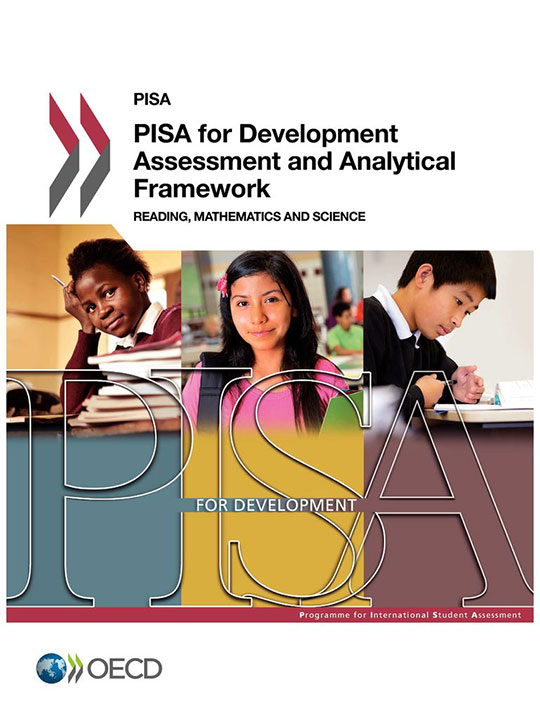
Autore: OECD (2018)
Editore: OECD Publishing, Paris
Codice ISBN: 9789264305274
DOI: 10.1787
What is important for citizens to know and be able to do?” The OECD Programme for International Student Assessment (PISA) seeks to answer that question through the most comprehensive and rigorous international assessment of student knowledge and skills. As more countries join its ranks, PISA is evolving to successfully cater for a larger and more diverse group of participants. The OECD launched the PISA for Development initiative in 2014 to support evidence-based policy making globally and offer universal tools in monitoring progress towards the Education Sustainable Development Goal. Spanning six years, this unique pilot project aims to make the assessment more accessible and relevant to a wider range of countries, while maintaining the overall PISA framework and accordance with PISA’s technical standards and usual practices.The PISA for Development Assessment and Analytical Framework presents the conceptual foundations of the project, and covers reading, mathematics and science. PISA for Development has a school-based component and an out-of-school one. For the school-based component, a questionnaire about students’ background is distributed to all participating students. School principals complete a school questionnaire that describes the school, its students and teachers, and the learning environment. Teachers also complete a questionnaire about themselves, the school’s resources, their teaching practice and their students. The out-of-school respondents complete a background questionnaire, and their parent (or person most knowledgeable about them) answers a questionnaire about the youth’s background and childhood experiences. A household observation questionnaire is completed by the interviewer, and information about the location of the household is collected by PISA for Development National Centres.Nine countries participated in the PISA for Development assessment: Bhutan, Cambodia, Ecuador, Guatemala, Honduras, Panama, Paraguay, Senegal and Zambia.
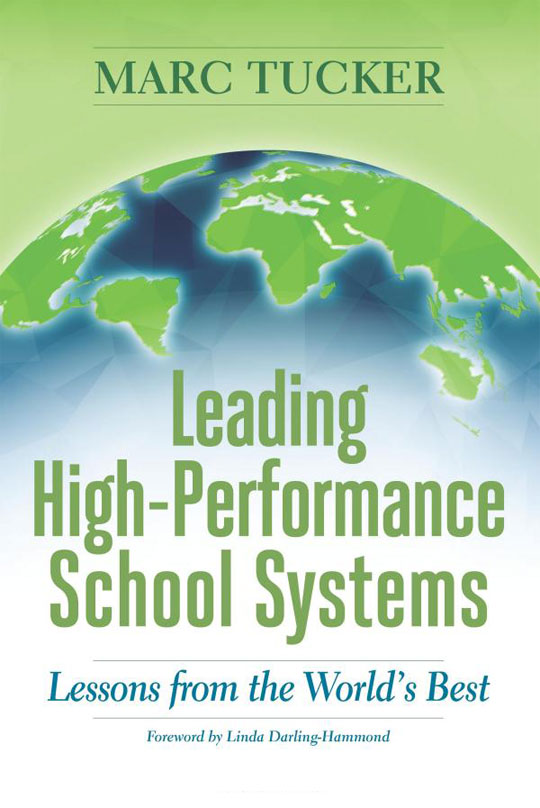
Autore: Marc Tucker (2019)
Editori: ASCD, Alexandria – NCEE, Washington
Codice ISBN: 9781416627005 (print) – 9781416627029 (online)
Did you know that close to half of today’s jobs in the United States could be done by robots and that proportion is rapidly increasing? It is quite possible that about half of today’s high school graduates will not have the knowledge or skills needed to get a decent job when they graduate. Tomorrow’s high school graduates will be able to thrive in this environment, but only if school superintendents, central office executives, and principals use the strategies employed by the world’s top-performing education systems to build the high-performance education systems today’s students will need to succeed tomorrow.

Autore: Andreas Schleicher (2018)
Editore: OECD Publishing, Paris
Codice ISBN: 9789264300002 (print) – 9789264299479 (online)
DOI: https://doi.org/10.1787/9789264300002-en
In a world where the kind of things that are easy to teach and test have also become easy to digitise and automate, it will be our imagination, our awareness and our sense of responsibility that will enable us to harness the opportunities of the 21st century to shape the world for the better. Tomorrow’s schools will need to help students think for themselves and join others, with empathy, in work and citizenship. They will need to help students develop a strong sense of right and wrong, and sensitivity to the claims that others make. What will it take for schools to be able to do this? Andreas Schleicher, initiator of the OECD Programme for International Student Assessment (PISA) and an international authority on education policy, has accompanied education leaders in over 70 countries in their efforts to design and implement forward-looking policies and practices. While improvement in education is far easier to proclaim than achieve, in this book Schleicher examines the many successes from which we can learn. This does not mean copying and pasting solutions from other schools or countries, but rather looking seriously and dispassionately at good practice in our own countries and elsewhere to understand what works in which contexts.
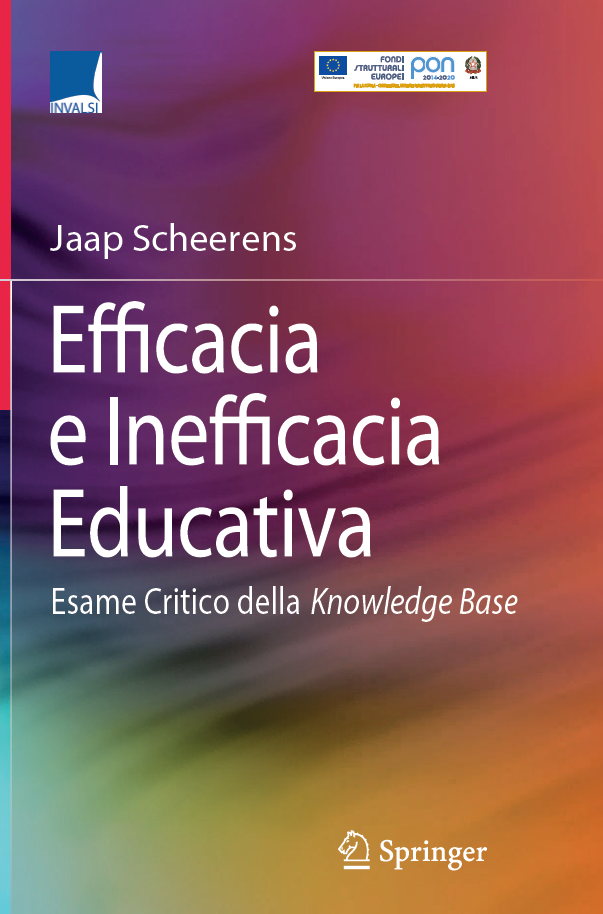
Autore: Jaap Scheerens (2018)
Editore: Springer, Dordrecht
Codice ISBN: 9788867564187
Il volume rappresenta una riflessione critica del complesso delle conoscenze prodotte dalla ricerca negli ultimi cinquant’anni sull’efficacia dell’insegnamento, proponendo una bibliografia che comprende oltre 700 pubblicazioni e ricerche internazionali, tra cui un’analisi critica delle più recenti rilevazioni PISA dell’OCSE.
Nel volume l’autore elabora una teoria “snella” della buona educazione scolastica, identificando e spiegando esempi pratici di “inefficacia educativa”, tra cui la carenza di un insegnamento “supportivo” e “attivante”, così come – a livello di istituzione scolastica considerata nel suo complesso – la difficoltà delle scuole di saper rendicontare i propri successi e i risultati formativi. Il libro si concentra anche sull’imprescindibile tema della relazione tra efficacia educativa e miglioramento, in un’ottica capace di tenere insieme l’analisi di sistema e il livello delle singole scuole, sino a scendere via via sempre più nel dettaglio nell’esaminare le buone pratiche di insegnamento.
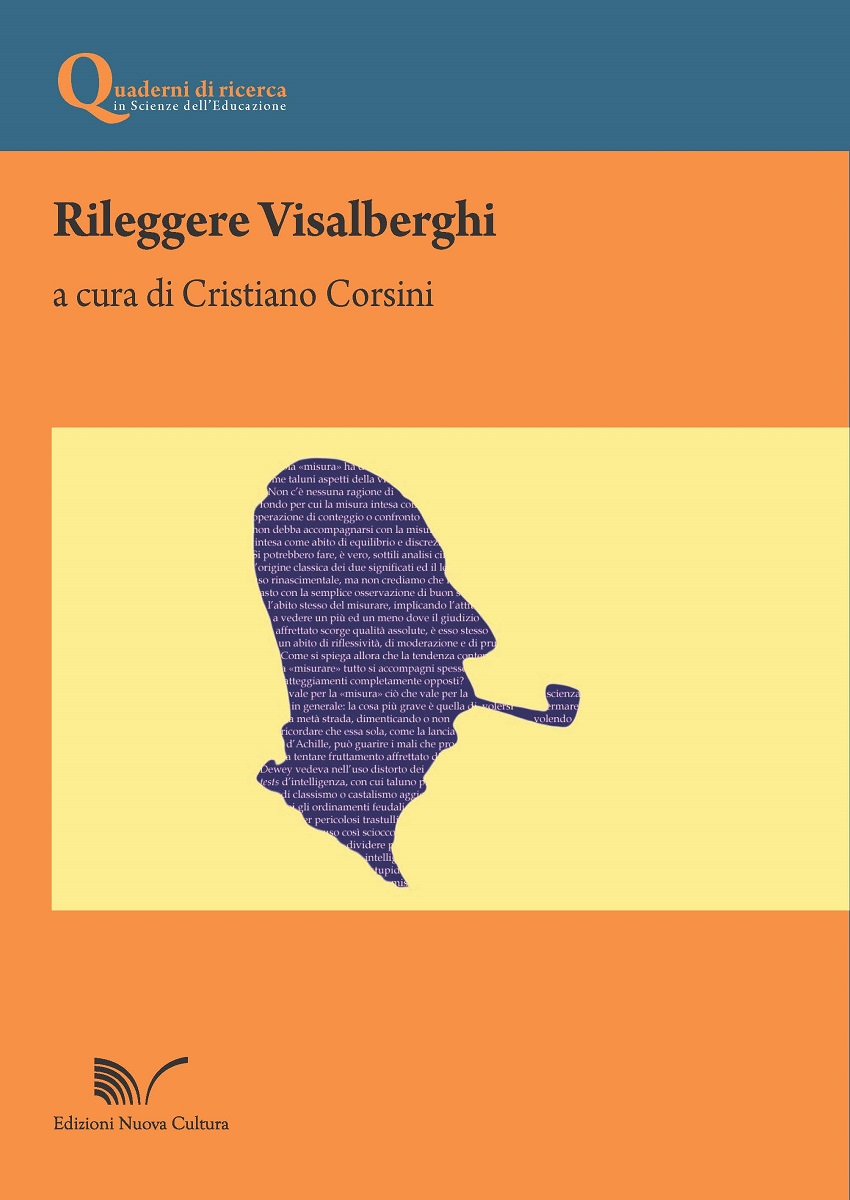
A cura di: Cristiano Corsini (2018)
Editore: Nuova Cultura, Roma
Codice ISBN: 9788833650098 (print) – 9788833650388 (online)
A oltre sessanta anni dalla sua pubblicazione, Misurazione e valutazione nel processo educativo (1955) di Aldo Visalberghi rappresenta ancora un utile punto di riferimento per leggere criticamente gli approcci emergenti nella valutazione di apprendimenti, scuole e università. Di fronte all’affermarsi di una “cultura della valutazione” che sembra negare il “senso della misura” invocato da Aldo Visalberghi, i richiami alla necessità di un rapporto dialettico tra valutazione e misurazione e a un’oggettività “relativa e critica” conservano intatto il loro valore.
Questo lavoro restituisce una prima raccolta di contributi degli esperti che, il 18 e 19 gennaio 2016, hanno partecipato al Convegno “Misurazione e Valutazione di scuole e università. Inattualità di Aldo Visalberghi”, organizzato presso il Dipartimento di Scienze della Formazione dell’Università di Catania. Le relazioni si concentrano sulla rilevanza del testo del 1955 in riferimento a due dinamiche ben presenti, oggi, nel nostro sistema educativo: quella relativa alla rilevazione degli apprendimenti e quella legata alla valutazione di scuole e università.

A cura di: Hongzhi Zhang, Philip Wing Keung Chan, Jane Kenway (2015)
Editore: Routledge, London
Codice ISBN: 9781138785960 (print) – 9781315767505 (online)
DOI: https://doi.org/10.4324/9781315767505
Unlearning and re-inventing the theoretical frameworks of Intercultural and Asian Studies is central to this book as it is to Chen Kuan-Hsing’s evocative Asia as Method; this book’s inspirational source. Chen insists that studies of Asia move beyond their paralysing fixation on the West as either a positive or negative referent and that they develop their own standpoints, reference points and research agendas. Asia as Method in Education Studies, is therefore, a provocative and suggestive exploration of educational ideas imported from the West. Chen’s challenge provokes the writers in this collection to consider the implications of colonial and imperialist forces for education systems, policies and practices as well as for educational research itself. The writers offer examples of what it means to rethink and re-examine education in Asia beyond both the Western imperialist eye and the post-colonial ‘politics of resentment’
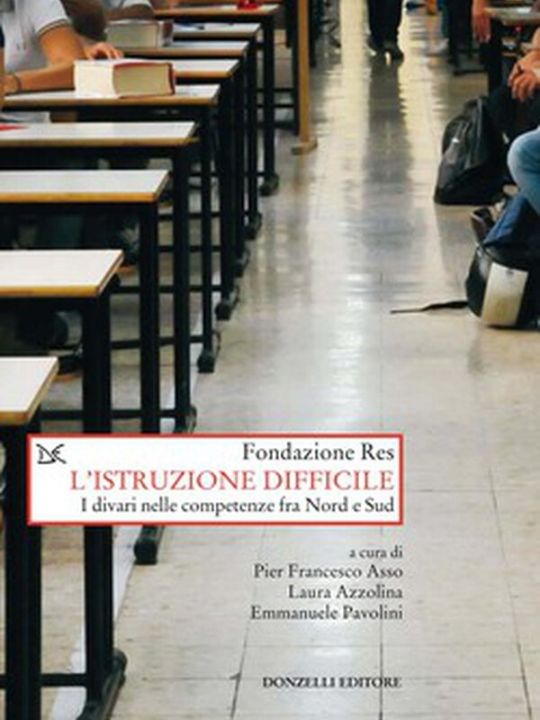
A cura di: Pier Francesco Asso, Laura Azzolina e Emmanuele Pavolini (2015)
Editore: Donzelli Editore, Roma
Codice ISBN: 9788868434168
La formazione di capitale umano qualificato è uno dei fattori all’origine della crescita economica. In questi anni di crisi, il Mezzogiorno sta sperimentando forti difficoltà nel produrre e valorizzare un tale capitale. Le ragioni di siffatta situazione dipendono non soltanto dai noti fenomeni legati all’emigrazione di giovani con livelli elevati di istruzione, ma anche dai cospicui ritardi negli apprendimenti e nelle competenze di base degli studenti meridionali. Questi risultati, spesso richiamati da indagini ufficiali e dalla letteratura scientifica, vengono confermati e approfonditi dal Rapporto Res 2014. Ma come si possono spiegare differenze così ampie nei rendimenti scolastici fra Nord e Sud del paese? Quanto conta il retroterra economico e culturale delle famiglie o la situazione del contesto locale? E quanto invece incidono i diversi attori, come dirigenti scolastici e insegnanti, che operano dentro la scuola e ne definiscono la capacità di formare le competenze degli studenti? Quali sono, in definitiva, i fattori che rendono veramente «difficile» il percorso di istruzione di un giovane siciliano o del Sud Italia? La ricerca, realizzata dalla Fondazione Res e curata da Pier Francesco Asso, Laura Azzolina e Emmanuele Pavolini, cerca di rispondere a queste domande e mostra in che modo i diversi fattori legati al contesto esterno o al buon funzionamento delle scuole influiscano sui divari territoriali negli apprendimenti. Ricorrendo a metodi di ricerca quantitativi e qualitativi, il volume indaga il mondo della scuola e approfondisce, anche attraverso l’ausilio di un consistente numero di studi di caso (siciliani e di altre regioni del Sud e del Nord), esperienze diverse da cui si traggono molti suggerimenti per la messa a punto di politiche dirette al miglioramento dei risultati dell’istruzione.
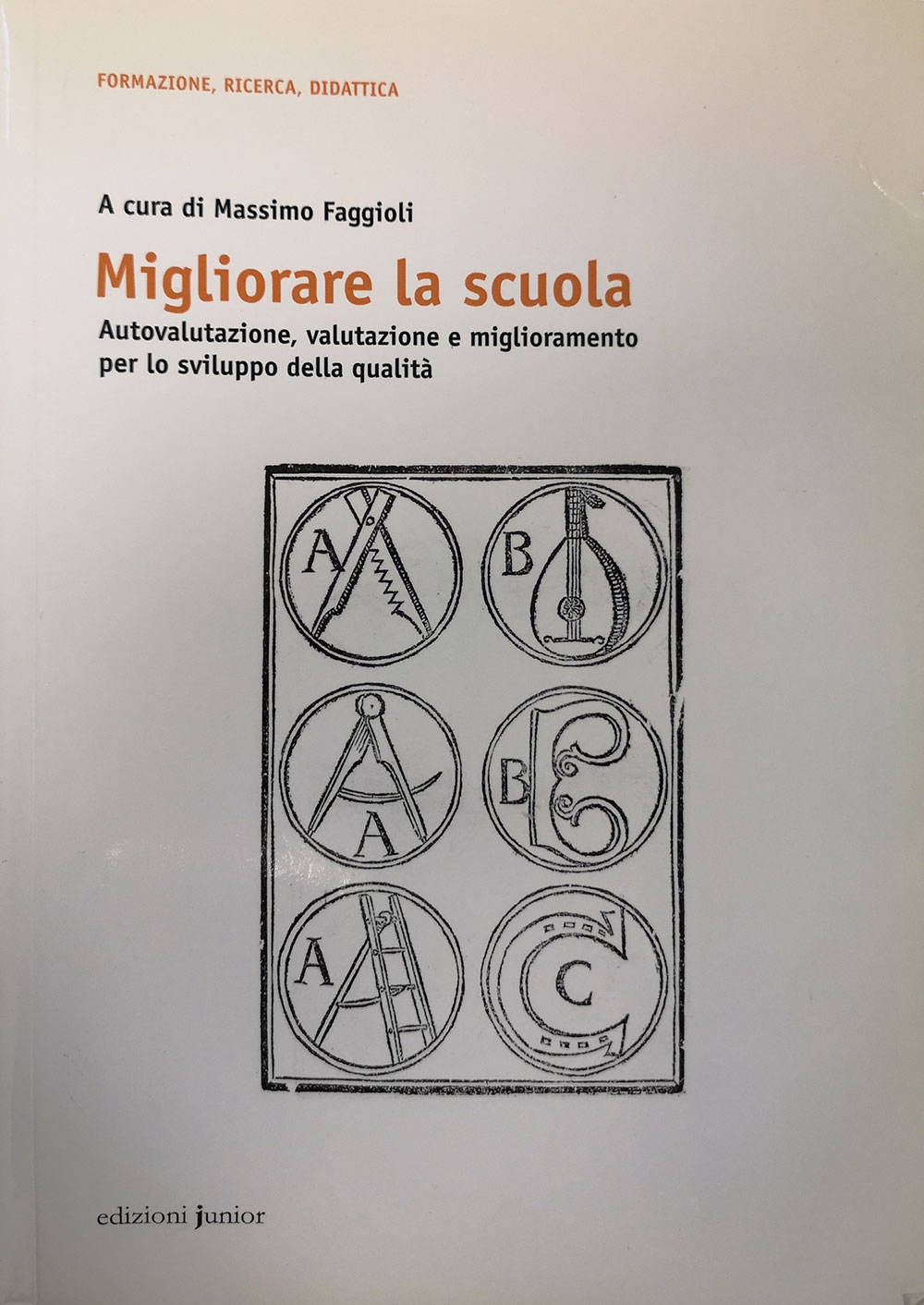
A cura di: Massimo Faggioli (2014)
Editore: Edizioni junior, Parma
Codice ISBN: 9788884346407
Come migliorare la scuola e darle nuovo impulso, rivitalizzando la voglia di cambiamento, in un sistema che vive una fase di crisi durissima? Da alcuni anni si parla della necessità di introdurre anche nelle scuole la cultura organizzativa, di ancorare i processi di innovazione a un quadro di maggiore certezza, a strumenti di analisi dei processi e degli esiti più puntuali e precisi. Il recente Sistema Nazionale di Valutazione può rappresentare una grande opportunità per dare impulso a questi processi, purché se ne colga il potenziale innovativo e non se ne faccia un’applicazione burocratica e formale. La messa a regime del nuovo sistema è un’occasione per valorizzare l’autonomia delle scuole, chiamate a confrontare gli esiti dell’autovalutazione con quelli della valutazione esterna per scegliere infine le priorità su cui intervenire con il piano di miglioramento: è la fase più interessante e innovativa che si realizza con l’ingresso della cultura organizzativa nella scuola, rendendola protagonista del governo dei processi ed esaltando la dimensione della sua autonomia. Il volume, frutto di una partnership di ricerca tra INDIRE e alcune Università, presenta i temi legati all’attivazione dei piani di miglioramento delle scuole e al supporto che dall’esterno si può dare per garantirne l’efficacia.
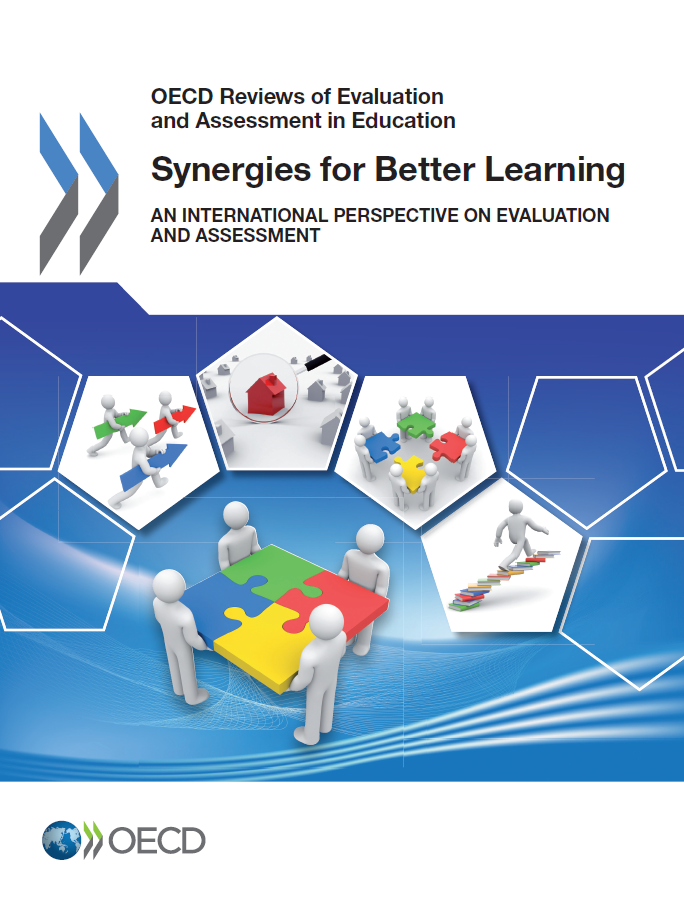
Autore: OECD (2013)
Editore: OECD Publishing, Paris
Codice ISBN: 9789264190658
Codice ISSN: 22230955 DOI: https://doi.org/10.1787/22230955
How can assessment and evaluation policies work together more effectively to improve student outcomes in primary and secondary schools? Countries increasingly use a range of techniques for student assessment, teacher appraisal, school evaluation, school leader appraisal and education system evaluation. However, they often face difficulties in implementing evaluation and assessment policies. This may arise as a result of poor policy design, lack of analysis of unintended consequences, little capacity for school agents to put evaluation procedures into practice, lack of an evaluation culture, or deficient use of evaluation results. This report provides an international comparative analysis and policy advice to countries on how evaluation and assessment arrangements can be embedded within a consistent framework to improve the quality, equity and efficiency of school education. It builds upon a major 3-year review of evaluation and assessment policies in 28 countries, the OECD Review on Evaluation and Assessment Frameworks for Improving School Outcomes. As well as analysing strengths and weaknesses of different approaches, the report provides recommendations for improvement including how results should be incorporated into policy and practice.
® INVALSI – Via Ippolito Nievo, 35 – 00153 ROMA – tel. 06 941851 – fax 06 94185215 – c.f. 92000450582 | Cookies – Privacy Policy – Photo Credits